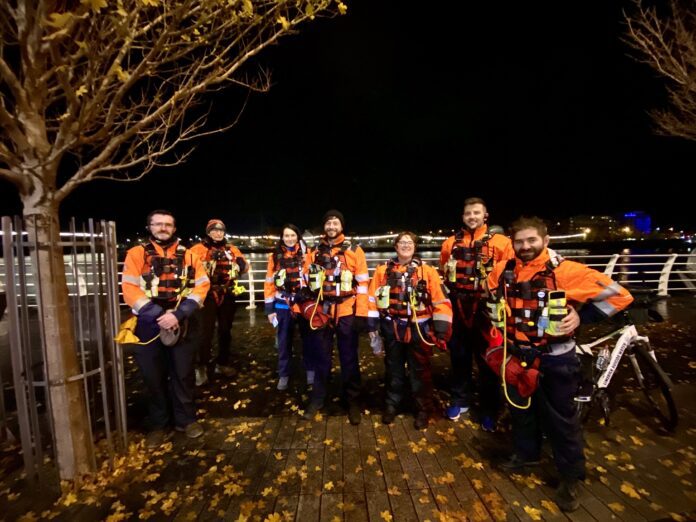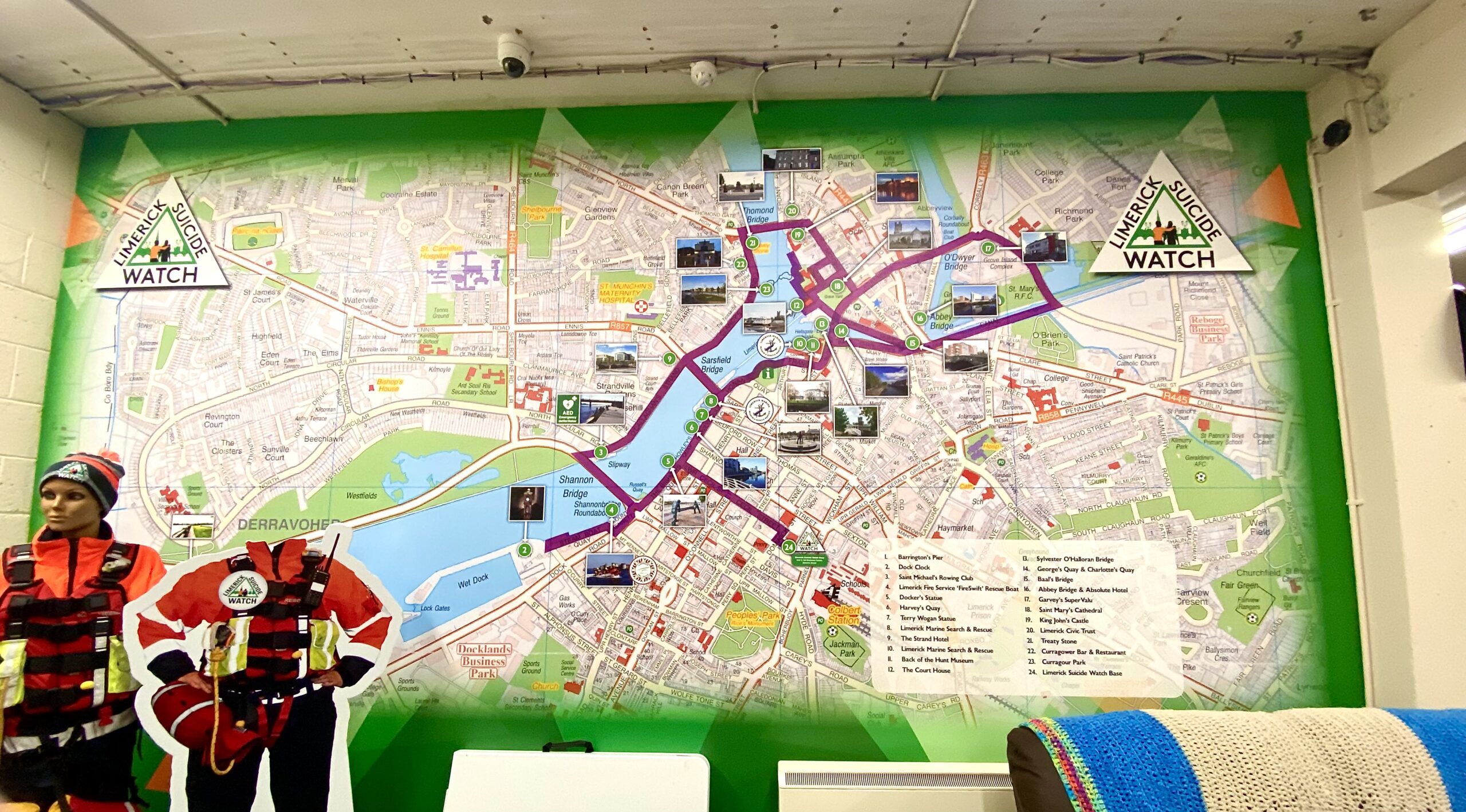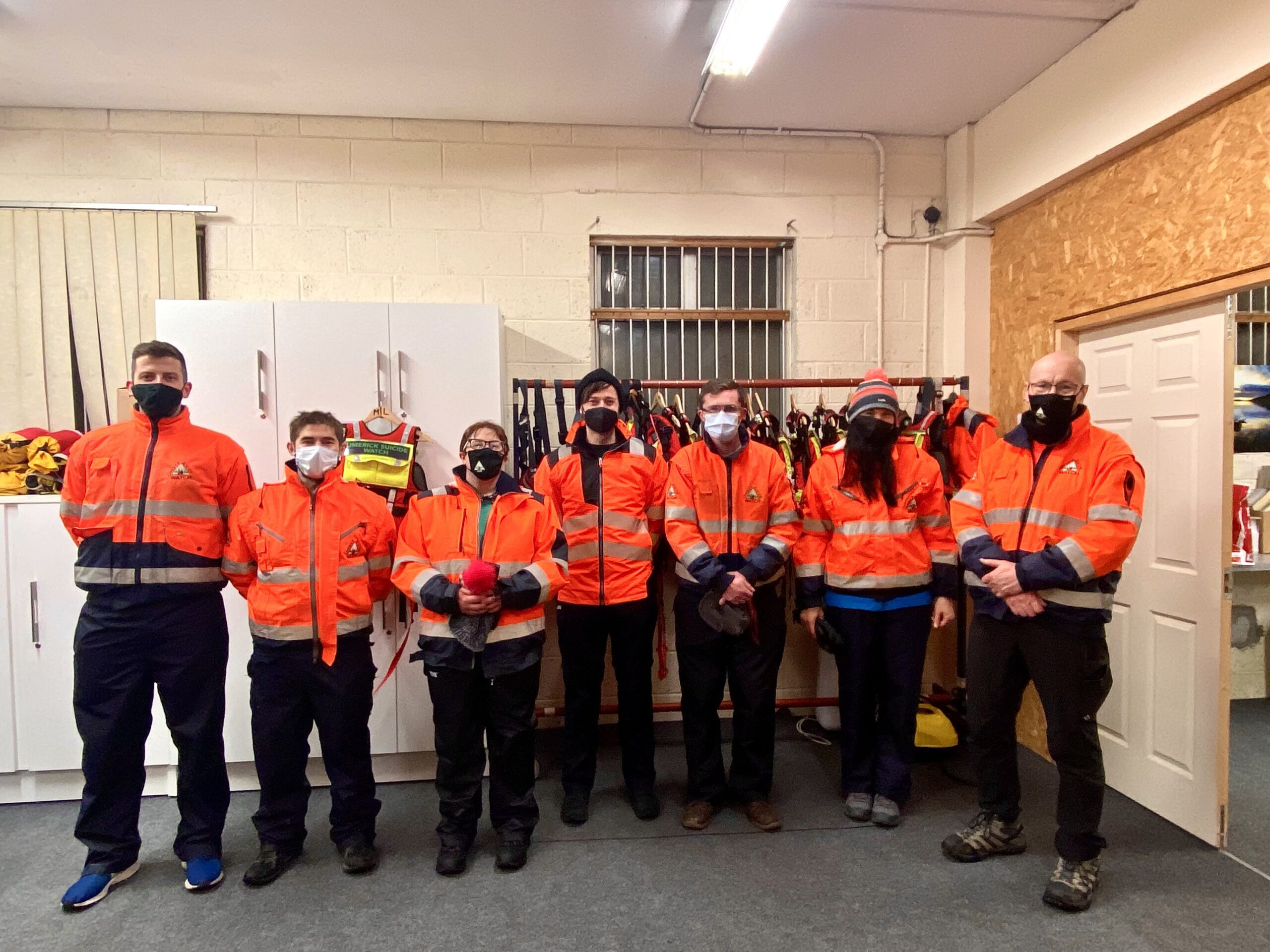
UL Journalism student Adam Leahy went on assignment with the Limerick Suicide Watch team, shadowing its volunteers on a cold, rainy night in the Treaty City.
SOUNDS and symbols mean different things in different places.
In Dublin, the sound of a helicopter can signal a thermal imaging sweep for illegal grow houses in the drugs trade. On motorways, it may indicate a serious collision and warn drivers to expect heavy traffic.
To the people of Limerick, the whirring of a helicopter’s rotor blades can often mean that there’s someone in the river.
Over the last decade, Limerick City has almost consistently had the highest suicide rates in Ireland. The city maintained the grim title exclusively from 2012 to 2016.
In 2014, the average suicide rate in Ireland for 100,000 people was 11. In Limerick it was 27.1. In 2019, the Irish average was 8.5. In Limerick, 16.7.
These figures represent the city alone. A separate tally is kept for the rest of the county.
One group that’s been working tirelessly to help fight these worrying figures is Limerick Suicide Watch (LSW).

Founded in 2016, in response to the growing suicide crisis in the city, its members can be seen in their bright orange jackets four nights a week patrolling the banks of the Shannon. Its team of more than 70 volunteers patrol the city quays a collective 5,540 hours each year.
The group has clocked up more than 800 ‘interventions’ – its term for providing aid and assistance to those contemplating, and often attempting, suicide.
Between May 2020 and May 2021 alone, the team clocked up 87 interventions.
To date, LSW has been attributed with saving more than 180 lives.
In a single night, over four-hour shifts that regularly run far longer than their allotted time, LSW volunteers will walk more than ten kilometres searching the quays and banks of the Shannon for signs of people in distress or worse.
A Call Comes In
The LSW team gather in their base just off Dominic Street before setting out on patrol for the 8pm to 1am shift.
The base is utilitarian. It has a room for equipment – high-visibility clothing, life jackets, binoculars, thermal cameras, other assorted accoutrements – a small kitchen, a number of bicycles, and a large map outlining the team’s regular route.
A handmade wallchart filled with pictures of the organisation’s committee of volunteers smiling warmly looks out into the room where a team of seven are gathered for briefing.
‘Alpha Team’ leader (patrols are broken up into three teams: ‘Alpha’, ‘Bravo’, and ‘Charlie’) Maija Krasna says that a call has come in. A person with a history of suicidal behaviour has been reported as potentially at risk in the area and the team are asked to be on the lookout.
Maija passes around a picture of the person taken earlier in the day. Each member of the team scans it carefully. The person is known to them from previous encounters.
Despite the alarm being raised and the team being on high alert, the night is quiet – though members, with their own set of hard-earned superstitions, avoid using the ‘Q-word’ as a matter of habit.
“Covid is having an effect on everyone’s mental health,” explained Public Relations Officer Elaine Leahy, who outlined the team’s intervention statistics from recent months.
In June, LSW conducted seven interventions. By August, that number doubled to 14. By September, it had risen to 21.
If this trend was to continue, Elaine says there’s no knowing how busy the team will be by this time next year.
Asked why Limerick has such a high suicide rate, LSW Safety Officer and Bravo Team Leader Tom Sheahan said: “I don’t know enough about the reasons behind suicide.”
“What I do know is that people come to the river. It’s such a huge element in the city. A lot of people have died inside in that river.”

Mechanical Banshees
At 10.25pm, a helicopter can be heard passing overhead. This puts Alpha Team on edge.
The sound of a helicopter’s blades rotating through the air holds a chilling meaning for people in Limerick that’s often difficult to believe for people outside the city.
Some locals call them ‘mechanical banshees’ because of their connection to searches for those attempting suicide in the waters of the Shannon.
Alpha Team leader Maija radios out to the Bravo and Charlie teams to ask if they’ve heard anything from emergency services. Nobody has heard anything.
Dave Mullen of Alpha Team pulls out his phone.
Dave is an LSW veteran. He’s been with the team for five years. He spotted LSW on patrol one night as he was out in the city socialising with friends and asked how he could join. Within a few weeks, he was walking the quays in the trademark orange.
He’s got an app on his phone that allows him to track helicopter activity across Ireland. He discovers that the helicopter belongs to Valentia Coast Guard. It’s been tracking a path along the Shannon through the city.
Dave makes a call to Valentia to see if the team can offer any assistance. Thankfully Valentia confirm that, to borrow a phrase, the coast is clear.
That One Encounter
“There’s a saying that if you save a life, you owe that person something,” says safety officer Tom Sheahan.
“I think part of them stays with you. You wonder did you do the right thing sometimes, you know? Because they’re in such distress.”
Tom has been with LSW since its inception. He was a member of the now defunct Corbett Suicide Prevention Patrol before that.
He’s been part of 18 “serious” interventions in his six years with the group.
“Most of them I can deal with,” he says. “But you never forget them.”
Many of the volunteers on patrol that night echo similar sentiments. There’s always one encounter that sticks with them.
Tom recalls an intervention with a teenage girl. She’d been the victim of abuse at the hands of a family member and had been called to testify in court against her abuser the next morning.
“She was standing over beyond the railings just leaning forward like that with her hands on the railings,” he says, holding his hands out behind him.
“We spoke to her and she eventually agreed that she wasn’t going to do it. But I always remember her. You don’t forget ones like that, you know?”
These aren’t isolated incidents for the volunteers of Limerick Suicide Watch. They aren’t experiences held only by the group’s oldest veterans. They’re heartbreakingly commonplace.
Niamh Liston is a junior member of the team. She’s been with the group only a couple of months. She too has had experiences she finds hard to leave at the door at the end of a night.
“I’ve been involved in a lot of interventions. Getting people over railings and over the bridge and stuff like that,” she explains.
“It’s such a relief when they don’t go in and they go off to the hospital or their family member picks them up or whatever.”
“It’s so hard seeing people in that distress. All you want to do is cuddle them and bring them home and mind them.”
With a chuckle she adds: “I’m a pure mammy.”
Interventions can take a toll on volunteers. Witnessing people in crisis night after night is a hard burden to bear, regardless of how successful their efforts are.
A welfare team made up of counsellors is on hand to check in with volunteers after distressing incidents. They provide support to members in an ongoing capacity, sometimes advising if a volunteer should take some time away after a particularly triggering intervention.
The Busy Nights
On patrol with Bravo Team, Tom and Niamh open up about the nights of the year they tend to perform the most interventions.
Unsurprisingly, Christmas week and New Year’s Eve are among their busiest times. Very close behind are Junior Cert and Leaving Cert results nights.
“First of all you’re getting a lot of young people not used to drinking much or taking drugs or whatever,” says Tom.
“If things haven’t gone their way with exams, with relationships, they get upset over things quite easily. And suddenly, you’re busy talking to people.”
State examinations are well known as periods of high stress for Irish teenagers. But the LSW team ranking them as highly as Christmas and New Year’s Eve as nights to be on high alert is particularly poignant.
“They’re there. They’ve lost their friends. They don’t know how to get home. They’ve no money. Something’s happened. A lot of times, it’s just people who are kind of distressed.”
A paternal instinct can be seen in Tom as he speaks about these unexpected red flag nights.
“It’s like leaving a child run free and suddenly it totters and it falls. It’s a bit like that with some youngsters.”
“You feel as though this is their first step into adulthood nearly, and some of them stumble. Most of them don’t, but some of them do. And it’s good to have somebody there to assist them back onto their feet again, you know?”
A Worrying Trend
LSW volunteers share many distressing stories, statistics, and thoughts over the course of the night, but the most worrying is their allusion to a trend of people from outside the county travelling to Limerick to end their lives by suicide – which has led to growing concerns about the river as a potential drawing point.
Some come from surrounding towns and landlocked counties, but the impression is given that it’s bigger than that. The LSW team have seen people coming from counties like Dublin, Cork, Tipperary, and Galway to die in Limerick’s waters too.
The evidence is purely anecdotal but the LSW teams’ experiences of this trend are very real.
The River Angels
It’s clear that there’s an incredible depth of respect and gratitude to the LSW volunteers from the people of Limerick.
Words of encouragement and thanks are shouted across streets almost constantly. Smiles and warm greetings from passersby light up a rainy winter night in the city.
Some fans on the group’s social media accounts refer to them affectionately as the ‘River Angels’.
Marine services, as well as other emergency services, say that suicide-related callouts in Limerick City have decreased substantially since the group was founded in 2016.
But what’s even more obvious is the sense of dedication to duty the LSW members pour into the work they do – how much they love the city that clearly loves them back.
As the clock strikes 1am, the official end of shift for LSW on a Thursday night, team leader Maija asks Alpha Team if they can check Barrington’s Pier (another suicide hotspot in the city) before heading back to base.
Without complaint, without hesitation, Alpha Team set out. It doesn’t matter what time it is. They have a job to do.


